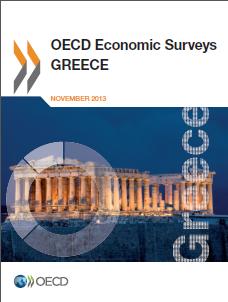Wolf, G., (2013), “Europe rightly pursues the road to a single resolution mechanism”, Bruegel, 27 Νοεμβρίου. European leaders continue to negotiate the most desirable structure of a single resolution mechanism. Making significant progress on that front is of central importance, as we have argued in a recent piece to the informal ECOFIN. The single most important reason why it is important relates to the reshaping of Europe’s financial system. Since …Read More
Micro and Macro analysis on household income, wealth and saving in the euro area
Honkkila, J. and Kavonius, I.K., (2013), “Micro and Macro analysis on household income, wealth and saving in the euro area”, European Central Bank, Working Paper No. 1619, Νοέμβριος. The report on the Measurement of Economic Performance and Social Progress by Stiglitz, Sen and Fitoussi concludes that in the measurement of household welfare all material components should be covered, i.e. consumption, income and wealth, from both the micro as well as …Read More
Το νέο παραγωγικό πρότυπο που πρέπει να έχει η Ελλάδα
Ευσταθόπουλος, Σ., (2013), “Το νέο παραγωγικό πρότυπο που πρέπει να έχει η Ελλάδα”, Foreign Affairs, The Hellenic Edition, 28 Νοεμβρίου. Η βιομηχανία στο σύνολό της, βιώνει τα τελευταία χρόνια σημαντικές αλλαγές, με νέες τεχνικές παραγωγής που βασίζονται στις ψηφιακές τεχνολογίες, στα προηγμένα υλικά, στη ρομποτική, στις Ανανεώσιμες Πηγές Ενέργειας, στην ανακύκλωση και στην επαναχρησιμοποίηση των πρώτων υλών. Όλες αυτές οι εξελίξεις επηρεάζουν πολλούς τομείς, όπως η μεταποίηση, η ενέργεια, οι …Read More
Growth, real exchange rates and trade protectionism since the financial crisis
Georgiadis, G. and Grab, J., (2013), “Growth, real exchange rates and trade protectionism since the financial crisis”, European Central Bank, Working Paper No. 1618, Νοέμβριος. Existing evidence suggests that protectionist activity since the financial crisis has been muted, raising the question whether the historically well-documented relationship between growth, real exchange rates and trade protectionism has broken down. This paper re-visits this relationship for the time period since 2009. To this …Read More
OECD Economic Surveys: Greece 2013
OECD, (2013), OECD Economic Surveys: Greece 2013, Paris: OECD Publishing. Greece, which has been under an internationally coordinated adjustment programme since 2010, has made impressive headway in cutting its fiscal deficit and implementing structural reforms to raise labour market flexibility and improve labour competitiveness. Shrinking domestic demand has also led to a substantial reduction of the current account deficit. Slow product market reforms held back price competitiveness and exports in …Read More
The Greek Budget Myth
Feldstein, M., (2013), “The Greek Budget Myth”, Project Syndicate, 27 Νοεμβρίου. Recently, newspaper headlines declared that Greece would have a balanced budget for 2013 as a whole. The news came as quite a shock: Recall that when Greek officials came clean about the true state of their country’s public finances in 2010, the budget deficit was more than 10% of GDP – a moment of statistical honesty that triggered the …Read More
The Greek paradox
Karamouzi, E., (2013), “The Greek paradox”. In LSE, The Crisis of EU Enlargement, London: LSE !deas. In recent years, Greece’s place in the EU has been ferociously debated as Athens’ financial and economic woes continue to trouble the stability of the euro and rattle the Eurozone markets. Contemporary press and European political elites alike engage in a seemingly endless blame game over the political origins of the Greek financial crisis. …Read More
Συνέντευξη Π. Τόμσεν στην ‘Καθημερινή’
Thomsen, P., (2013), Συνέντευξη στην ‘Καθημερινή’, Η Καθημερινή, 24 Νοεμβρίου. Η Ελλάδα θα χρειασθεί να λάβει νέα μέτρα την περίοδο 2014 – 2016, όχι οριζόντια, αλλά στοχευμένα, ώστε να μην πληγούν οι πιο αδύναμες ομάδες του πληθυσμού, τονίζει σε συνέντευξή του στην «Κ» ο επικεφαλής του προγράμματος του Διεθνούς Νομισματικού Ταμείου για την Ελλάδα, Πόουλ Τόμσεν. Αν και αποδίδει εύσημα στη χώρα μας για τη μέχρι τώρα τεράστια δημοσιονομική προσαρμογή, …Read More
Fostering a European identity is unlikely to be a successful method for increasing citizens’ trust in the EU
Harteveld, E., (2013), “Fostering a European identity is unlikely to be a successful method for increasing citizens’ trust in the EU”, LSE European Politics and Policy Blog, 27 Νοεμβρίου. The financial crisis has rekindled debates about the legitimacy of the European Union and, in particular, whether citizens trust the EU. Using Eurobarometer data, Eelco Harteveld analyses three possible sources for trust in the EU: rational evaluation, identity and projection. He …Read More
Brain drain, a new challenge for the Eurozone
Katsikas, D., (2013), “Brain drain, a new challenge for the Eurozone”, EurActiv, Opinion Article, 25 Νοεμβρίου. Only a genuine growth agenda can nurture labour mobility, a pre-requisite for the efficient operation of the eurozone and ultimately, for the vision of a conflict-free Europe. Without such agenda mobility could become one of the principal factors of the eurozone’s disintegration, writes Dimitris Katsikas. “As the crisis persists, news of increasing movement of …Read More





